Chimpanzee: Facts, Strength, Lifespan, Height, Diet, Habitat
All You Need To Know About The Chimpanzee
Chimpanzee: Facts, Strength, Lifespan, Height, Diet, and Habitat. All you need to know about the Chimpanzee, Explore the best Places to See Chimpanzee in Africa
The chimpanzee in Africa is one of the continent’s most compelling ambassadors of wild intelligence and social complexity. Sleek, curious, and astonishingly human in behavior, chimpanzees live in tight-knit communities that use tools, teach their young, communicate with rich vocalizations, and display distinct cultural traditions from group to group. Seeing them in the wild, whether high in the forests of Uganda, Rwanda, or the Congo basin, is not just a wildlife encounter but a window into evolutionary kinship: moments of play, careful grooming, cooperative hunting, and quiet family bonds that stay with visitors long after the trek ends. Their presence animates forests, supports biodiversity, and offers powerful storytelling for conservation and ecotourism ventures that prioritize respect, minimal impact, and deep learning.
Protecting chimpanzees means protecting whole ecosystems and the human communities that share them. Populations face habitat loss, poaching, and disease, so responsible tourism and conservation programs are vital: well-managed chimp treks fund anti-poaching patrols, community education, and sustainable livelihoods that reduce pressure on forests. For travelers, choosing ethical operators like JimJam Safaris Africa, those who follow strict viewing distances, limit group sizes, and invest in local guides and conservation, turns a single visit into long-term support for protection and research. Whether you’re a nature lover, a researcher, or someone seeking a meaningful journey, investing time and resources in chimpanzee conservation offers unforgettable experiences and a measurable impact, a rare chance to help safeguard a sentient, social cousin of ours while standing in awe of Africa’s living heritage.
Chimpanzee Facts
Native to central and western Africa, chimpanzees (Pan troglodytes) are extremely intelligent great apes. They inhabit adaptable, multi-female, multi-male societies with intricate social structures, close-knit families, and a wide range of behaviors, including cooperative hunting, tool use, and group cultural variance. Researchers observe that chimpanzees, who share 98–99% of their DNA with humans, exhibit social learning, teaching, emotional depth, and problem-solving skills that span generations. They use vocalizations, gestures, and facial expressions to communicate, and people build enduring relationships that affect leadership, mate availability, and food access. Population disparities and the significance of ethical tourism and conservation financing for their survival are shown by long-term field investigations.
Chimpanzee Strength
Despite their moderate size, chimpanzees possess remarkable strength and agility that outstrips humans in many tasks, especially those requiring upper-body power. Their muscular shoulders, arms, and hands are adapted for climbing, brachiation, and powerful pulling motions, enabling rapid, acrobatic movement through the canopy and robust terrestrial locomotion when needed. Strong grips and opposable thumbs allow precise manipulation of tools, nuts cracked with stones, termites fished with sticks, and leaves fashioned as sponges, demonstrating both physical power and dexterous control. This combination of brute force and fine motor skill supports complex social behaviors like cooperative hunting and displays, and contributes to survival in challenging forest environments where agility and strength are essential.
Chimpanzee Lifespan
Chimpanzees typically live between thirty and forty years in the wild, yet human activities like hunting and habitat loss, disease exposure, predation, and habitat quality all have a significant impact on longevity. Females usually start having babies in their early teens and spend a lot of money caring for them, which results in a slow population turnover due to the long interbirth intervals. While captive chimpanzees frequently live longer, sometimes into their fifties, due to consistent feeding, veterinary care, and the lack of poaching, individuals can live into their late thirties or early forties in safe, protected environments. To increase survival and restore healthy age structures among populations, conservation initiatives that restrict human–wildlife conflict, prevent disease transmission, and preserve habitat connectivity are crucial.
Chimpanzee Height
Male chimpanzees are usually between 1.2 and 1.5 meters tall while standing erect, while females are somewhat shorter. However, as most of their mobility is knuckle-walking, bipedal height is rarely maintained. Adult chimps vary by subspecies and geographical location. Strong upper bodies and long arms in relation to legs are highlighted by body proportions, which make throwing, climbing, and suspension easier. Height is complemented by weight; adult males typically weigh between 40 and 70 kg, while females weigh between 30 and 50 kg. Habitat, subspecies, and nutrition all affect these numbers. Field measurements and rehabilitation records are utilized to track population condition, growth, and health because apparent size also depends on age and posture; young people look thinner.
Chimpanzee Diet
Chimpanzees are omnivorous opportunists whose diets shift seasonally and regionally according to availability. Ripe fruit commonly forms the bulk of intake, supplemented by leaves, flowers, seeds, pith, and other plant material that provide fiber and micronutrients. They also incorporate animal protein, large insects like termites, bird eggs, and small to medium mammals, often acquired through organized group hunts where cooperation improves success. Tool-assisted foraging expands their dietary niche: communities use sticks to extract insects, stones to crack nuts, and leaves as sponges, skills that transfer culturally between individuals. Dietary flexibility helps them cope with changing environments, but reliance on diverse habitats makes them vulnerable when forests are fragmented or degraded by human activity.
Chimpanzee Habitat
Chimpanzees occupy a mosaic of forested habitats across equatorial Africa, from dense lowland rainforests and gallery forests to montane woodlands and savanna, forest mosaics, reflecting notable ecological adaptability. Their range includes countries such as Guinea, Sierra Leone, the Ivory Coast, Cameroon, the Central African Republic, the Democratic Republic of Congo, Uganda, Rwanda, and Tanzania, but populations are patchy and increasingly fragmented. Habitat structure shapes group size, movement patterns, and diet: closed-canopy forests favor arboreal travel and fruit feeding, while mosaic landscapes demand broader ranging and varied foraging strategies. Fragmentation isolates groups, reduces genetic exchange, and heightens extinction risk, so corridors, protected areas, and community-managed forests are critical to maintain connectivity and long-term viability.
Chimpanzee Gallery
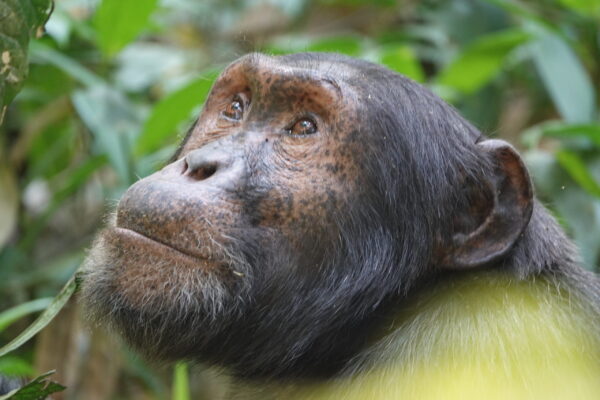
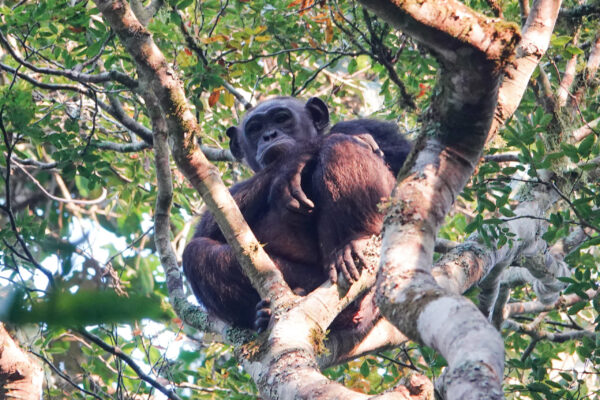
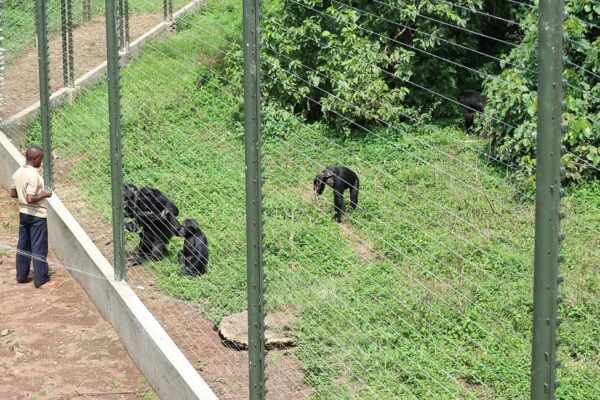
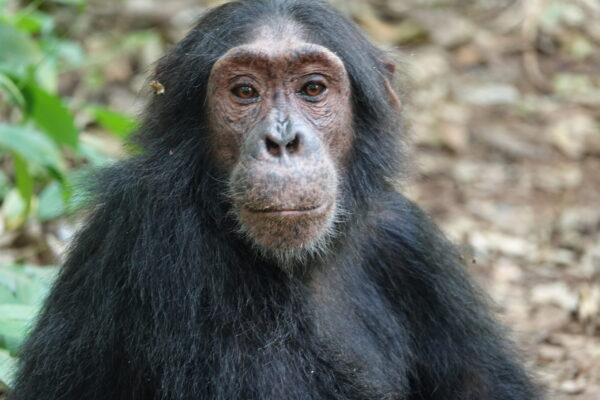
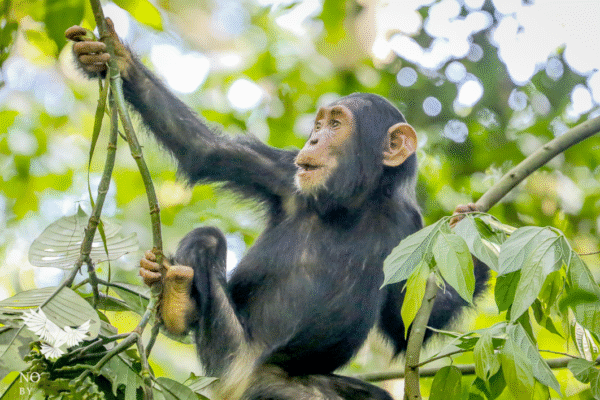
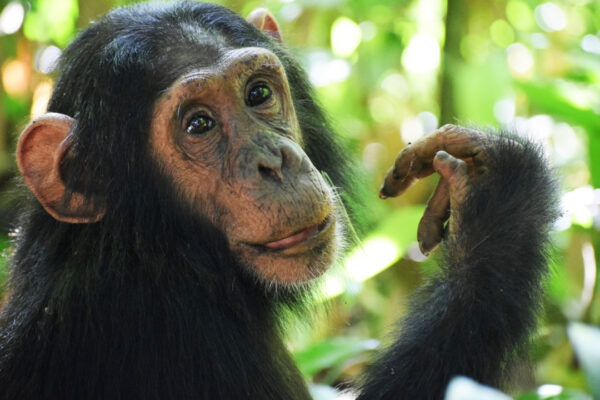
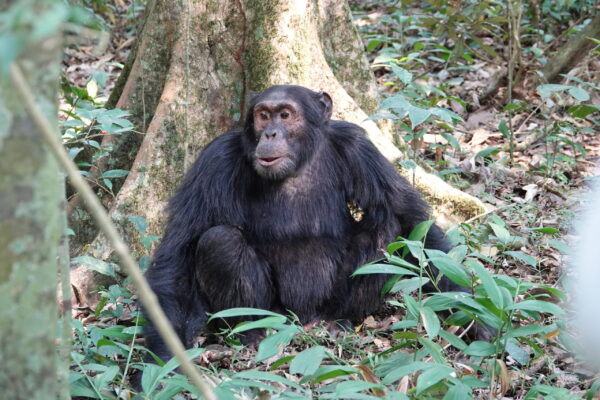

Why are chimpanzees endangered?
Chimpanzees are endangered mainly because humans are destroying and fragmenting the forests they need, and because of direct killing and capture. Large areas of chimp habitat have been cleared for agriculture, logging, mining, and roads, which isolates populations and reduces food and shelter. At the same time, hunting for bushmeat and the illegal capture of infants for the pet trade remove individuals (often reproductive adults) faster than populations can replace them. These combined pressures have driven chimp numbers down from historic levels to an estimated 170,000–300,000 today and placed the species at high extinction risk.
Disease and low reproductive resilience make recovery even harder. Chimpanzees catch many human illnesses (they’re vulnerable to 100+ human pathogens), and outbreaks such as Ebola have killed huge numbers of great apes; political instability and weak law enforcement can let poaching and illegal logging continue unchecked. Chimpanzees also reproduce slowly (females have long intervals between births), so losing adults, especially breeding females, has a big, long-lasting effect on population size. Conservation actions that help are protected and well-managed reserves, anti-poaching patrols, community-based programs that reduce dependence on forest hunting, and responsible ecotourism that funds local protection.
Where To Find Chimpanzees in Africa
Chimpanzees are best found in Africa’s remaining large forests and forest, savanna mosaics across West, Central, and East Africa, but your highest chance to see habituated groups on guided treks is in a handful of well-managed parks and research sites. In East Africa, Kibale Forest in Uganda is famous for reliable chimpanzee encounters and established trekking programs; in Rwanda, Chimpanzee tracking activities happen in Nyungwe Forest. In Tanzania, Gombe Stream (made famous by Jane Goodall) and the remote Mahale Mountains offer classic research sites and immersive chimp trekking along Lake Tanganyika. In West Africa, Taï National Park in Côte d’Ivoire hosts long-running chimp research and conservation projects, with truly wild populations studied by field teams.
If you’re planning a visit, look for habituated groups (so sightings are ethical and safe), local research or park-run programs, and operators that reinvest fees into anti-poaching and community work; these factors both increase your chances of seeing chimps and directly support their protection. Expect anything from short, easy forest walks to all-day, strenuous treks, depending on the site and season; many parks run small-group encounters limited to one hour with strict viewing rules to minimise disturbance. Choose operators that follow those rules and partner with locally based conservation efforts; that’s the most responsible way to turn a wildlife trip into lasting support for chimpanzee survival.
Travel Advice From JimJam Safaris
We cater to all ages, budgets, interests, and fitness levels. Our team can assist with queries about Chimpanzee tours, Accommodations, bookings, and Affordable Luxury destinations. We will respond to your Inquiry as soon as possible. Our team of friendly and service-minded Safari Consultants is available to assist you in creating a private, personalized, and tailor-made Safari Itinerary and to answer any questions you may have. Are you dreaming of the Wildebeest Migration? Gorilla Trekking in Africa? Honeymoon In Africa or Africa’s Big 5 Experiences? Start planning your affordable luxury African tours with the Affordable Luxury African Safari Company (JimJam Safaris & Tours Africa). We tailor-make African Safaris for First Timers, 7-Day African Safari Tours, African Bush Safaris, and Beach Vacations.